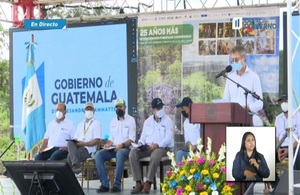British Ambassador visits Petén and welcomes renewed forestry concessions in Guatemala
The UK called for greater global climate ambition ahead of COP26 and applauded Guatemala's long-term commitments.

The British Ambassador to Guatemala, Nick Wittingham, visited Petén on October 22 to participate in the delivery ceremony of three Community Concession Extension Contracts for 25 years in the Maya Biosphere Reserve (RBM), in Petén. Additionally, two new Community Concession Management Units were awarded.
The National Council of Protected Areas of Guatemala (CONAP), the governing body of biodiversity in the country, authorized these concessions that allow generating income, health, education, among other benefits to about 10,000 direct beneficiaries and approximately 50,000 indirect beneficiaries within the communities. At the same time, this scheme allows different actions to be carried out in favour of the protection, conservation, management and sustainable use of biological diversity.
The event was chaired by the President of the Republic, Alejandro Giammattei; the Director of CONAP, Carlos Martínez; the Minister of Environment and Natural Resources, Mario Rojas; the Departmental Governor of Petén, Luis Burgos; William Popp, Ambassador of the United States, Romeo Ruiz Armento, Ambassador of Mexico; Thomas Peyker, Ambassador of the European Union; Alejandro Santos, Country Director of Rainforest Alliance; Marcedonio Cortave, Director of ACOFOP; Marcial Córdova Álvarez representative of the community organizations Arbol Verde, AFISAP and Laborantes del Bosque.
During his intervention, Ambassador Whittingham highlighted that the concessions constitute a milestone in the conservation efforts of the largest block of continuous tropical forest in the north of the continent. The MBR is an important buffer zone for reducing emissions and its contribution to combating climate change is invaluable.
The UK is calling for urgent global action in response to United Nations reports on the science of climate change, which say the planet has warmed more than previously estimated. COP26, to be held in a week in Glasgow, will seek to increase global climate ambition and take immediate action to help cut emissions in half.
Progress has been made globally since the Paris Agreement was signed in 2015. More than 85 new or updated Nationally Determined Contributions (NDCs) have been submitted through 2030, representing more than 110 Parties, to establish how the countries will reduce their emissions and tackle the climate crisis. The United Kingdom hopes that Guatemala can soon make an announcement along these lines and join other environmental initiatives in the framework of COP26.
Meanwhile, the UK remains committed to Guatemala’s efforts to protect its biodiversity and tackle the effects of climate change. Between 2020 and 2022, the United Kingdom will have invested more than US$1 million in projects in Petén to address issues linked to the protection of biodiversity, combat illegal trafficking of species and bring development opportunities to vulnerable communities.
Last September, the UK also announced a Biodiversity Landscapes Fund that over seven years will invest US$20 million in the Northern Triangle of Central America, including the RBM. The Fund is part of the UK’s commitments ahead of COP26 and builds on the successes achieved at the G7, where its leaders pledged to protect and conserve 30% of the world’s land and oceans by 2030.
Currently, the RBM has 12 Concessions, totalling around 500 thousand hectares, of which 10 of these were granted to local community organizations and 2 granted to industrial companies between the nineties and the beginning of this century. This was done in compliance with the Protected Areas Law and the Peace Accords signed in Guatemala in 1996.